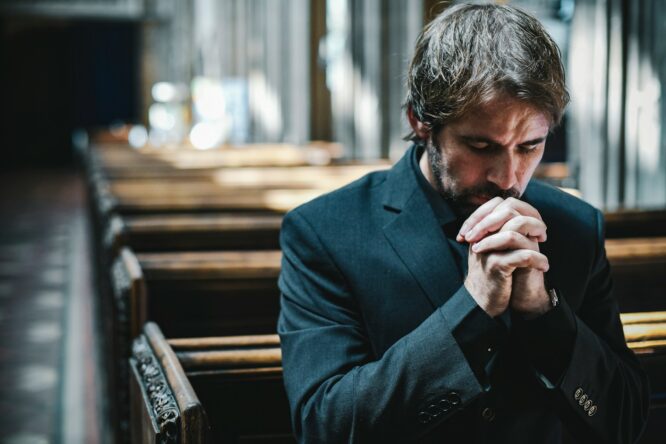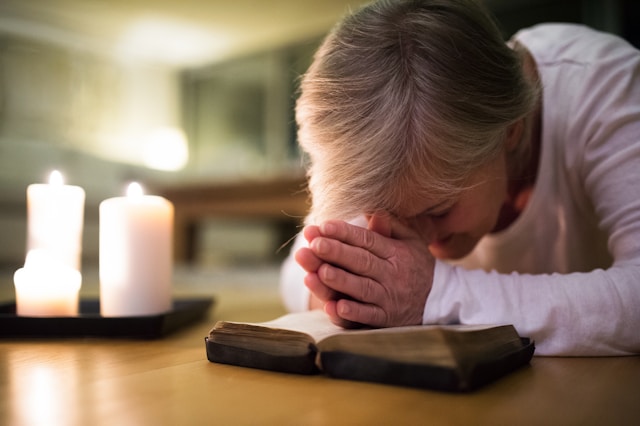If you’re a person of faith, chances are, the religion you follow has certain values, traditions, and guidelines to follow.

These things help you feel more connected with your higher power and allow you to build a life based around your beliefs in ways that should be meaningful and rewarding. However, you can stick to every rule and still feel like something’s missing. These signs show up when religion becomes a checklist, and the deeper stuff it was meant to connect you to starts slipping.
1. You care more about being right than being decent.

If conversations about faith turn into debates where you’re trying to prove a point, it might be a sign something’s off. Following your beliefs shouldn’t come at the cost of kindness or respect for other people. When the goal becomes winning arguments or showing people they’re wrong, it’s easy to lose sight of the basics, such as compassion, patience, and listening. It’s hard to connect with something meaningful when you’re always on the defence.
2. You follow the rituals, but they feel kind of empty.

Maybe you say the prayers, attend the services, and stick to the routine, but deep down, it just feels like going through the motions. That doesn’t mean you’re doing something wrong; it might just mean you’ve disconnected from the meaning behind it all. Habits are useful, but they’re supposed to bring you closer to something real. If they’re starting to feel more like obligations than anything else, it could be time to ask what’s missing underneath it all.
3. You feel like it’s your job to correct everyone else.

If you find yourself quietly judging people who don’t follow the rules like you do, or flat-out telling them how they should do it, it’s probably not about faith anymore. It might just be control in disguise. Spiritual stuff gets personal fast, and everyone’s approach is going to look a little different. If your instinct is to call it out instead of understand it, it might be a sign you’re focusing on the wrong things.
4. Missing one practice makes you feel like a total failure.

Let’s say you skip a service, forget a fast, or mess up a prayer. Do you spiral with guilt or feel like you’ve ruined everything? That’s not how it’s supposed to work. Faith isn’t about perfection; it’s about connection. If messing up once sends you into panic mode, you might be chasing rules more than meaning. A small slip-up shouldn’t cancel out everything good you’ve built.
5. You’re doing things mainly to avoid being punished.

If most of your motivation comes from fear—of consequences, judgement, or doing something “wrong”—that’s a red flag. Fear might keep you in line, but it rarely helps you grow. Doing something just because you’re scared not to isn’t connection, it’s pressure. And over time, it can make you dread the very practices that are supposed to bring peace or purpose.
6. You’re constantly measuring other people’s behaviour.

Whether it’s someone dressing differently, questioning things, or living outside the norms—you might find yourself quietly ranking their “spiritual score.” However, focusing on other people’s behaviour too much can become a distraction from your own stuff. It’s easy to slip into “I would never do that” territory. But when faith turns into a scoreboard, the point gets lost. It becomes about appearances, not actual connection or growth.
7. You’re doing everything right, but feel disconnected anyway.

You might be following every rule, keeping up with the traditions, and sticking to your routine, but still feel weirdly distant from the whole thing. That’s usually a sign it’s become habit, not heart. That doesn’t mean you’ve failed. It just means you might need to slow down and reconnect with why you started all this in the first place. Sometimes, less doing and more reflection can help bring things back into focus.
8. You’re scared to ask real questions.

If you’ve ever swallowed a doubt or avoided a tough conversation because you were afraid it meant you weren’t “faithful enough,” you’re definitely not alone. But that fear can shut down real connection fast. Asking questions doesn’t make you weak—it makes you honest. If you feel like curiosity is dangerous, it might mean you’re stuck in a system that prioritises control over actual growth or discovery.
9. You worry more about looking faithful than being genuine.

If your main concern is how spiritual you seem to other people—saying the right things, performing the right way—it’s easy to lose track of how real it actually feels. Performing faith is different from living it. It’s okay to want to belong or show respect, but if it’s all for show, eventually it starts to feel hollow. There’s no point in following rules if they don’t mean anything to you anymore.
10. You use guilt to keep yourself in line.

Some guilt is natural, especially if you’ve gone against something that matters to you. Of course, if guilt is the only reason you’re showing up, sticking to rules, or praying, it might be time to unpack that. Guilt can keep you moving short-term, but it burns you out fast. You deserve to feel connected, not just controlled. And if guilt is the loudest voice in your spiritual life, the balance might be off.
11. You keep parts of yourself hidden around other believers.
 Source: Pexels
Source: Pexels When you feel like you can’t be fully honest—about your doubts, your lifestyle, or what you’re really going through—it can turn community into performance. And that’s a lonely place to be. If you feel like you have to filter everything just to be accepted, it might be worth asking if the community values real connection, or just compliance. Spiritual spaces should feel honest, not stiff.
12. You treat your faith like a checklist.

It starts off with good intentions—daily prayer, service, reading, showing up. However, when it becomes something you’re just trying to “complete,” it can start feeling more like a task list than something personal. Checking boxes might give you a temporary sense of control, but it won’t feed your soul for long. If the meaning behind the practices disappears, it’s okay to slow down and find your way back to what matters.
13. You avoid anyone who believes differently.

If conversations with people outside your belief system feel threatening or uncomfortable, it might be a sign your faith is more fragile than it seems. A strong belief system can hold space for differences without falling apart. Avoiding other perspectives doesn’t protect you—it isolates you. Some of the best insight comes from hearing other people’s stories and learning how they got where they are. You don’t have to agree to grow.
14. You feel burnt out from trying to “get it right” all the time.

If your faith life feels exhausting, like you’re constantly falling short or trying to keep up with a never-ending list of expectations, it might be time to take a breath. Exhaustion isn’t the point of any of this. Spiritual connection should feel grounding, not like another chore. If you’re burned out from trying to meet everyone else’s definition of “devotion,” maybe it’s time to redefine what this looks like for you—without the pressure.



